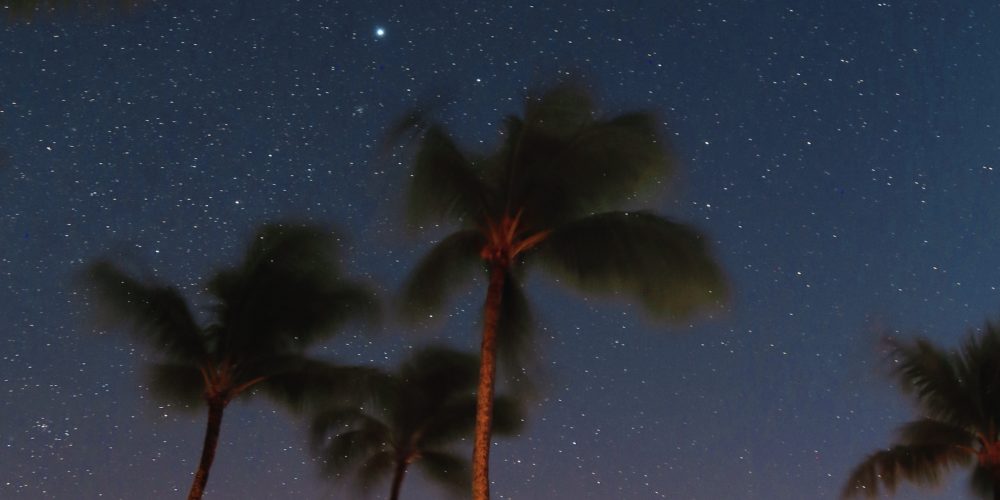How to live, even though living is futile

To gaze upwards while standing on the silver sands of our coastline at night is to experience awe. Where humankind’s light pollution is low, the universe above comes into sharp focus; the dark expanse reveals its glittering jewels to our eyes. We can glimpse the incalculable distances; we catch a glimmer of how impossibly vast our reality is.
Faced with this conundrum, can you or I think that we are anything other than a speck on a speck—just one of the teeming billions of humans, living on one tiny planet, meaningless in the scale of the universe around us?
What do any of our activities or achievements matter when faced with the vastness of the expanse? We make our own consciousness the centre of our personal universe, but a glance upward reveals an uncomfortable truth: we are nothing, just space dust. Nothing we do truly matters. We can set up huge corporations, lead whole nations, change the course of human history—it is still nothing, since we are mere gnats flitting in the immensity of life.
How does one look down from the incomprehensible night sky, and still continue with one’s mundane tasks? Whatever we are about to do is unimportant when seen from above us. How are we to make any sense of the absurdity of our condition—that we are trivial creatures engaged in trivial activities? It is a question I often ask myself.
My answer comes from looking straight down after looking up. There are creatures in the sand beneath our feet who have no sense of the boundlessness of the world around them. They know only their immediate reality; they live in the smallness of their surroundings. And so they get on with the basics of their work on Earth: they seek nourishment; they avoid danger; they reproduce. It is utterly basic; but it is all they know; it is all they do. They do not ponder, they do not reflect; they certainly do not write articles like this one for their kin to read.
We humans are only a little higher than those lifeforms. We, too, have our work to do. We, too, must survive and propagate as our first priorities. No matter what is above us or around us, or what awaits us, we have earthly duties to fulfil.
We must: keep ourselves clean; cook our food; sweep our floors; raise our offspring; make useful products; teach valuable lessons; calculate our returns; help our brethren; remember to laugh; record our events; sell what we make; be kind to one another; know our history; study our planet; advance our knowledge; organize our lives; stay fit and strong.
None of that really matters; yet all of it matters.
Albert Camus chronicled the absurdity of human life. He wrote of Sisyphus, who was condemned to push a boulder up a mountain every day of his life, only to see it roll down again. And again. All our activities are Sisyphean—they are laborious, repetitive, banal, and ultimately pointless. We make good meals and enjoy them, only to make them again. We make breakthrough business deals, only to press repeat. We win elections, only to lose the next ones. At the end of one’s life, it is easy to ask: what was all that for? All that frenzied activity; all that stress and agitation; all that sweat and labour? In the end I am about to become dust again. After me, someone else will push the rock I leave behind. That rock, too, will roll back down.
Nothing lasts; no victory is final. And yet, Camus’s famous final sentence in his essay, The Myth of Sisyphus, was: “One must imagine Sisyphus happy.” The happiness comes from the complete acknowledgement of absurdity and futility, not from its denial. We must see our lives for what they are; we must laugh at them; and then we must continue them. We must, as Camus exhorts us, be superior to our fate; we must be stronger than our rock.
And so I continue to write these words; as you must continue to do that which preoccupies you. I push my rock, as you push yours. The point of it all is not to ascend the mountain, for we will only discover other higher mountains. The point is to go up and down while being in continuous awe of the beauty and mystery around us. To notice the sunshine filtering through the trees, triggering birdsong; to observe the energy and joy of the sea’s waves as they race towards the shore, only to be extinguished on the sand. To rejoice briefly in the life we have, with all its contradictions.
Camus himself died absurdly, at the age of 46, when the car he was travelling in crashed into a tree. He left us with these words to ponder: “The struggle itself towards the heights is enough to fill a man’s heart.”
(Sunday Nation, 3rd April 2022)

Buy Sunny Bindra's new book
The X in CX
here »
Popular Posts
- The pause that saves usJune 8, 2025
- Where are you rushing to—your funeral?June 29, 2025
- How to spot a real thinkerJune 15, 2025
- Built the app, forgot the flowJune 22, 2025
- The first push is the hardestJune 1, 2025















